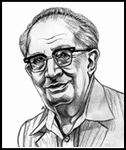Jacob Rabinow
Jacob Rabinow (1910-1999) was born in Kharkov, Russia and emigrated with his family during the Revolution and arrived via China to New York in 1921. In due time, earned a bachelor’s degree in Engineering (1933) and graduate degree in Electrical Engineering from City College of New York. In 1938, gaining a post at the National Bureau of Standards (now the National Institute of Standards and Technology, or “NIST”), Rabinow began his truly prolific career as an inventor.
His earliest inventions, through the 1950s, were in defense systems, including the mechanical and safety elements of fuses and guidance systems for missiles. Rabinow became Chief of NBS’ Electro-Mechanical Ordnance Division before leaving to form his own consulting firm (1954). In the mid- to late 1950s, Rabinow invented and patented a number of truly revolutionary devices: the first magnetic computer memory to use a disc instead of a tape for data storage (1954); the first automobile clutch to work by magnetic and not electrostatic charge, still used in some foreign cars (1956); the first phonograph whose cartridge moved along a straight track rather than at the end of a swinging arm, which anticipated a craze by over twenty years (1959); the first self-regulating clock, once used in all American cars (1960); and his best known invention, a “Reading Machine” (1960).
This scanned printed material and compared each character to a set of standards in a matrix, using (for the first time ever) the “Best Match Principle” to determine the original message. Rabinow’s original device, now on permanent display at the Smithsonian’s National Museum of American History, formed the basis for the reading, sorting and processing machines used by post offices and banks to this day.
Rabinow returned to NBS in 1972, where he was Chief Research Engineer until his retirement in 1989. He worked for NIST as a consultant, as well as lecturing on invention to audiences ranging from school children to members of Congress during his retirement. From 1944 to 1998, Jacob Rabinow earned 229 U.S. patents. His illustrious career of invention earned him such honors as the President’s Certificate of Merit (1948), the Industrial R&D Scientist of the Year Award (1960), the Harry Diamond Award (1977) and the Lemelson-MIT Lifetime Achievement Award (1998). He was inducted into the National Inventors Hall of Fame in 2005.


